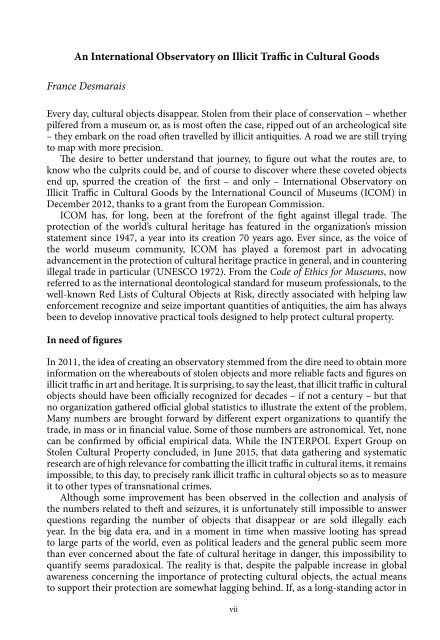Countering
Book_observatory_illicit_traffic_version%20issuu
Book_observatory_illicit_traffic_version%20issuu
You also want an ePaper? Increase the reach of your titles
YUMPU automatically turns print PDFs into web optimized ePapers that Google loves.
France Desmarais<br />
the global fight against illicit traffic, ICOM wants to keep developing useful tools and<br />
proposing appropriate response mechanisms to effectively counter the illegal trade, it<br />
needs to know and understand the phenomenon as yet. Identifying the trade routes,<br />
the agents involved and the types of objects targeted is the only way to comprehend the<br />
significance of the illegal art and antiquities market. This can only be tackled through<br />
transdisciplinary research initiatives, such as that initiated with the Observatory project,<br />
as relevant organizations are encouraged to do under the 1970 UNESCO Convention.<br />
Indeed, Article 17 of the Convention on the Means of Prohibiting and Preventing the<br />
Illicit Import, Export and Transfer of Ownership of Cultural Property mentions the<br />
possibility for relevant organizations to conduct studies on matters related to the illicit<br />
movement of cultural property. Looting and illicit traffic represent one of the global<br />
challenges yet to be faced, for which a research and data gathering body such as the<br />
International Observatory in Illicit Traffic in Cultural Goods is needed.<br />
What we do know for a fact is that museums are particularly concerned by theft in<br />
art and heritage, as primary places of conservation from which objects can be stolen,<br />
but also as collecting institutions that could, unwillingly, end up buying looted cultural<br />
property. Indeed, objects are not only stolen from museums, but they can also land,<br />
with the help of sometimes ill-informed accomplices, in the hands of private collectors.<br />
Later, through a donation for example, they might find themselves in museums. It is<br />
specifically because stolen art and antiquities risk falling into museum collections that it<br />
is the duty of the world museum community to come together and counter illicit traffic<br />
in art and heritage. The inaugural gesture is to apply strict ethical practice concerning<br />
provenance of acquisitions. But it does not suffice. It must be supported by strong<br />
national programmes.<br />
Duty to protect objects from the market<br />
One of the other objectives of the Observatory was to gather information on measures<br />
which the concerned countries have implemented to fight illicit traffic in cultural goods.<br />
What, indeed, are States Parties to international conventions doing to implement<br />
effectively the provisions of those laws and treaties? What mechanisms have been<br />
developed to monitor theft and to ensure seizures? How could we help them increase<br />
transnational cooperation to improve import and export controls? Those are all questions<br />
we have been able to directly address in over 10 missions carried out for the Observatory.<br />
What we have discovered by interviewing national authorities is what we initially<br />
suspected: political will is essentially lacking. With real political will to protect movable<br />
heritage would come adequate legislative tools and effective administrative capacities.<br />
Countries need stronger national legislation to strengthen the implementation of the<br />
international legal tools they have ratified. That is, if they are signatory to the relevant<br />
instruments, insofar as the 1970 UNESCO Convention on the Means of Prohibiting and<br />
Preventing the Illicit Import, Export and Transfer of Ownership of Cultural Property<br />
is still very unevenly implemented and the 1995 UNIDROIT Convention on Stolen or<br />
Illegally Exported Cultural Objects is insufficiently ratified. To put it plainly: why have<br />
none of the traditional ‘destination countries’ for cultural objects ratified UNIDROIT?<br />
What prevents governments from ratifying and passing law to further protect cultural<br />
heritage of the world?<br />
The example of Germany may explain the reticence of certain governments. While,<br />
in 2015, Germany courageously brought forward updated draft legislation to prevent<br />
xiii


